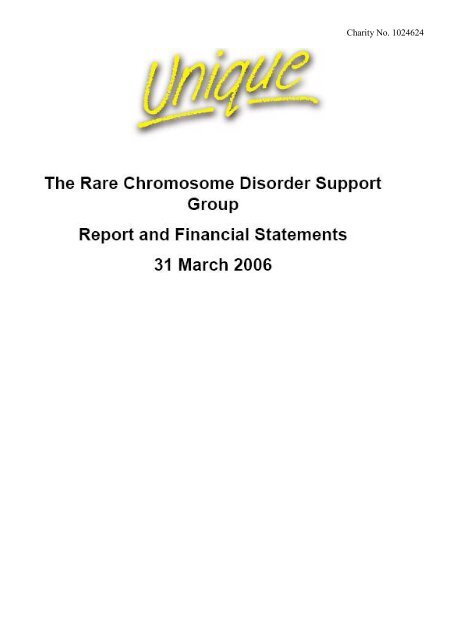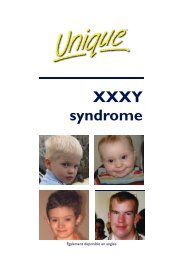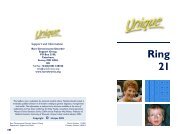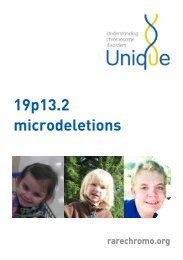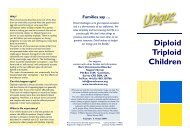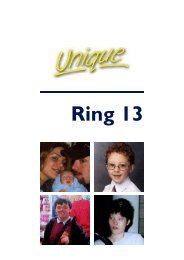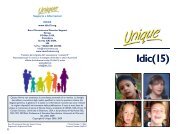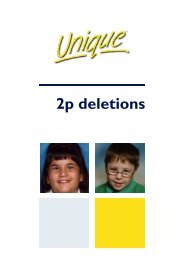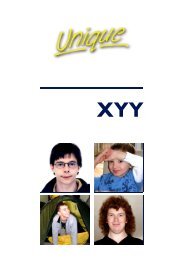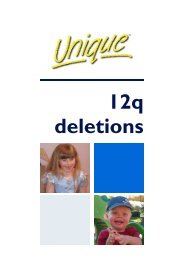Trustee Annual report - Unique - The Rare Chromosome Disorder ...
Trustee Annual report - Unique - The Rare Chromosome Disorder ...
Trustee Annual report - Unique - The Rare Chromosome Disorder ...
Create successful ePaper yourself
Turn your PDF publications into a flip-book with our unique Google optimized e-Paper software.
Charity No. 1024624
Legal and Administrative Details<br />
For the Year Ended 31 March 2006<br />
Status <strong>The</strong> organisation is a registered charity, registered on 5 August 1993<br />
Governing Document <strong>The</strong> charity is constituted under a trust deed dated 24 July 1993.<br />
Charity Number 1024624<br />
Registered Office<br />
<strong>Trustee</strong>s<br />
Management Committee<br />
179 Bakers Ground<br />
Stoke Gifford<br />
Bristol<br />
BS34 8GE<br />
Edna Knight<br />
Gillian Manvell<br />
Marie Layng<br />
Carey Hunt<br />
Sarah Trevitt<br />
Eleanor Fiske<br />
Michael Patterson<br />
Staff Beverly Searle Development Director<br />
Marion Mitchell Family Support Officer<br />
Prisca Middlemiss Information Officer<br />
Lydia Dickie Assistant Information Officer<br />
Julie Griffin Finance Officer<br />
Medical Advisor<br />
Professor Maj Hulten<br />
Bankers National Westminster Bank Plc Charities Aid Foundation<br />
PO Box 9<br />
Kings Hill<br />
1 Upper Market Square West Malling<br />
Hanley<br />
Kent<br />
Stoke-on-Trent<br />
ME19 4TA<br />
St1 1QA<br />
Auditors<br />
Godfrey Wilson Ltd<br />
Chartered Accountants & Registered Auditors<br />
48 West End<br />
Minchinhampton<br />
Gloucestershire<br />
GL6 9JA
<strong>The</strong> trustees are pleased to present their <strong>report</strong> and audited financial statements for the year ended 31<br />
March 2006.<br />
Legal and administrative information set out on page 1 forms part of this <strong>report</strong>. <strong>The</strong> financial statements<br />
comply with current statutory requirements, the memorandum and articles of association and the<br />
Statement of Recommended Practice – Accounting and Reporting by Charities (issued in March 2005).<br />
Structure, Governance and Management<br />
<strong>The</strong> <strong>Rare</strong> <strong>Chromosome</strong> <strong>Disorder</strong> Support Group, known as “<strong>Unique</strong>”, became a registered charity on 24<br />
July 1993.<br />
A board of trustees is responsible for the overall governance of the charity. <strong>Trustee</strong>s are either named<br />
within the constitution or are elected. <strong>Unique</strong> has three trustees and a management committee of seven<br />
members (including trustees) which meets with staff and the charity’s chief medical advisor at least four<br />
times a year to review the group’s work and formulate strategy. <strong>Unique</strong> also benefits from the services of<br />
professional medical advisors who liaise with the charity’s employees.<br />
<strong>Unique</strong> employs five members of staff two full-time and three part-time. <strong>The</strong> charity benefits from the<br />
donated services of members who use their professional skills and knowledge to assist the group in<br />
areas including ICT, fundraising, marketing, creative design, copywriting, HR and legal advice as well as<br />
with general administrative support. <strong>The</strong> Development Director is responsible to the management<br />
committee for the day to day operations of the charity and implements policies agreed by the board of<br />
trustees. <strong>The</strong> Finance Officer assists the Development Director in financial matters.<br />
A risk register is maintained to identify and monitor implications for the charity should its main strategic<br />
goals not be achieved or operating conditions change. <strong>The</strong> register is under review, with contingency<br />
plans to deal with challenges that might arise.<br />
<strong>The</strong> response from families and professionals to the work of <strong>Unique</strong> is logged and reviewed continuously.<br />
Feedback arrives by letter, telephone, email and via the private members’ forum of the <strong>Unique</strong> website or<br />
through information submitted for publication in the charity’s magazine. <strong>The</strong> introductory pack sent to<br />
new inquirers contains a basic evaluation form and service guide sheets. More detailed evaluation forms<br />
are included with letters sent out by the Assistant Information Officer and in conference and study day<br />
packs. <strong>The</strong> direction of future work is influenced by feedback from members.<br />
Company limited by guarantee<br />
At a general meeting of members of the <strong>Rare</strong> <strong>Chromosome</strong> <strong>Disorder</strong> Support Group on 23 April 2005, an<br />
extraordinary resolution was passed accepting the trustees' proposal to transfer the assets, liabilities and<br />
activities of the charity to a newly formed company limited by guarantee. <strong>Unique</strong> RCD Ltd, sharing the<br />
aims and objectives of the original charity, was duly incorporated on 23 May 2005 with the approval of<br />
the Charities Commission. Subsequently the company name was changed to <strong>Rare</strong> <strong>Chromosome</strong><br />
<strong>Disorder</strong> Support Group and registered in England & Wales as company number 5460413, charity<br />
number 1110661. At the date of writing this <strong>report</strong>, the transfer of the assets, liabilities and activities from<br />
the original charity to the company limited by guarantee had been completed.
Objectives and Activities<br />
Objects<br />
<strong>Unique</strong> aims to provide links between families whose children have similar clinical and/or practical<br />
problems caused by rare chromosome disorders. A rare chromosome disorder causing disabilities and<br />
health problems can occur in at least one in every 1,000 live births. <strong>The</strong> overall figure for any rare<br />
chromosome disorder (including balanced rearrangements that do not cause disability and ill health) is at<br />
least one in 200 live births.<br />
<strong>Unique</strong> aims to raise awareness of rare chromosome disorders, their high incidence and their<br />
significance, both in the UK and overseas, and works closely with professional contacts.<br />
Activities<br />
<strong>Unique</strong>’s core charitable activities are categorised under two primary headings:<br />
1. Family Support Services<br />
2. Awareness Raising.<br />
1. Family Support Services<br />
<strong>Unique</strong> acts as an international support group and aims to provide the following core services on an<br />
ongoing basis:<br />
A high-quality magazine produced three times each year and distributed to members. This<br />
publication is the ‘face’ of <strong>Unique</strong> to many families.<br />
<br />
<br />
<br />
A comprehensive website at www.rarechromo.org, which attracts the worldwide rare chromosome<br />
disorder community to <strong>Unique</strong>.<br />
A 24-hour helpline service to support families needing information and to relieve parents and carers in<br />
times of distress and isolation.<br />
An annual conference held in the UK to bring together families and professionals and share<br />
knowledge of advances in diagnosis as well as information helpful in the daily lives of those affected<br />
by a rare chromosome disorder.<br />
To provide the core support group services, <strong>Unique</strong> has developed the following resources:<br />
<br />
<br />
<br />
A confidential offline database updated at least once a year, which keeps individual records showing<br />
the lifetime effects and consequences of specific rare chromosome disorders on each affected<br />
member of <strong>Unique</strong>. This constitutes a unique resource that is not available anywhere else in the<br />
world. <strong>The</strong> <strong>Unique</strong> database manager uses the data to respond to requests for information from<br />
clinical geneticists, researchers and other professionals as well as from families and people with rare<br />
chromosome disorders.<br />
<strong>The</strong> <strong>Unique</strong> information project, which builds on our range of published material to support more<br />
families affected by rare chromosome disorders<br />
Indirect family support delivered via professionals which builds on our existing relationships with<br />
professional bodies and individuals working with families affected by rare chromosome disorders,<br />
including contributions to medical research into the effects and health issues relating to rare<br />
chromosome disorders.
2. Awareness raising<br />
<strong>Unique</strong> aims to educate the general public about rare chromosome disorders through talks and<br />
presentations and using national and local media when appropriate.<br />
Achievements and Performance<br />
1. Family Support Services<br />
Membership of <strong>Unique</strong> continues to grow at a steady rate, illustrated by the following figures.<br />
Family Members<br />
(cumulative)<br />
31 March<br />
2004<br />
31 March<br />
2005<br />
31 March<br />
2006<br />
4,000 4,500 4,920<br />
New families 488 412 400<br />
Total countries 64 65 68<br />
6000<br />
5000<br />
4000<br />
3000<br />
2000<br />
1000<br />
0<br />
2006<br />
1984<br />
1986<br />
1988<br />
1990<br />
1992<br />
1994<br />
1996<br />
1998<br />
2000<br />
2002<br />
2004<br />
Magazine<br />
We publish a highly acclaimed magazine three times a year in which families<br />
and professionals share their knowledge and experiences. <strong>The</strong> magazine<br />
contains information on topics such as health-related, behavioural and<br />
disability issues and how to cope with them, relevant disability and health<br />
legislation, financial and benefits information and education for children with<br />
special needs, as well as a focus on advances in genetic knowledge and<br />
testing and reproduction options. <strong>The</strong> full-colour magazine is professionally<br />
produced to a high standard. Each issue costs £10,000 to produce and<br />
distribute to members.<br />
A special edition of the magazine brought information from the October 2005<br />
conference to 4,800 member families worldwide.<br />
Website: www.rarechromo.org<br />
31 March 2004 31 March 2005 31 March 2006<br />
Website ‘hits’ 87,798 119,569 170,193<br />
Messages posted<br />
on members’ forum<br />
2,000 2,352 2,876<br />
Members can go to “collect” an electronic version of the magazine from the new magazine archive held in<br />
the password-protected part of the website. So far over 500 member families have chosen the electronic<br />
delivery route, saving the group a considerable sum in postage and printing costs.<br />
<strong>The</strong> Development Director and her husband, an IT consultant, worked throughout the year to develop the<br />
new website, launched in March 2006. Over 50 booklets and flyers about rare chromosome disorders<br />
can be accessed through and downloaded from the password-protected members’ area with many more<br />
to come, along with new areas for professionals and ‘Friends of <strong>Unique</strong>’.<br />
Over 200 hours were donated by Trevor Searle to develop the site in addition to the regular hours he<br />
devotes to developing and maintaining the <strong>Unique</strong> database and ICT capacity. Mr Searle’s professional<br />
time dedicated this year alone to the charity has been valued at £20,000.
Helpline<br />
Telephone enquiries<br />
(cumulative)<br />
Email enquiries<br />
(cumulative)<br />
31 March 2004 31 March 2005 31 March 2006<br />
4,500 5,200 6,000<br />
32,146 49,560 73,200<br />
<strong>The</strong> Development Director continues to support the 24-hour helpline and acts as the initial point of<br />
contact for all new families.<br />
Conference<br />
<strong>The</strong> 11th <strong>Unique</strong> conference took place from 21 to 23 October 2005 at the Daventry Hotel, Daventry, UK.<br />
<strong>The</strong> conference attracted eminent professional speakers and workshop leaders as well as over 250<br />
family delegates. <strong>The</strong> focus was on advances in genetic testing and diagnosis. Workshops were held on<br />
other issues pertinent to families’ daily circumstances, such as sleep disorders and challenging<br />
behaviour. Its net cost to <strong>Unique</strong> for 2005 was under £10,000.<br />
A conference <strong>report</strong> is available to the public on the home page of www.rarechromo.org – the charity’s<br />
website.<br />
<strong>Trustee</strong>s’ summary<br />
<strong>The</strong> trustees are delighted by the excellent outcomes of the charity’s Family Support Services. <strong>The</strong><br />
<strong>Unique</strong> magazine continues to be an excellent production and has evolved significantly from its beginning<br />
as a basic newsletter. <strong>The</strong> 11 th <strong>Unique</strong> conference was a highly successful weekend and the feedback<br />
from members proves it to be a worthwhile activity that is valued immensely. Thanks go to the Family<br />
Support Officer who works tirelessly to ensure that each conference is even better than the last. It is<br />
regrettable that insufficient income prevents <strong>Unique</strong> from holding the conference annually.<br />
<strong>The</strong> trustees recognise that the huge frontline response to families, much of it bespoke, is generated by a<br />
tiny number of highly dedicated staff. Thanks are due to all employees who work hard to support families<br />
by providing prompt information and creating opportunities for social contact to relieve often profound<br />
feelings of isolation. Special mention must be made of the long hours put in by the Development Director<br />
herself to provide an instant response of the highest quality to every inquiry. To provide more support to<br />
staff performing an invaluable service is at the heart of trustees’ current concerns over resources.
Maintaining the <strong>Unique</strong> Database<br />
<strong>Unique</strong> maintains a comprehensive offline database detailing lifetime effects of specific chromosome<br />
disorders on individual members, providing an invaluable source of information for new and existing<br />
members and professionals. From the database, staff are able to provide inquiring professionals with<br />
anonymised information about the effects of a specific rare chromosome disorder. This is particularly<br />
helpful when there is no <strong>Unique</strong> information leaflet on a specific condition. Feedback from professionals,<br />
especially geneticists and paediatricians, has demonstrated that this service has proved invaluable to<br />
them in counselling and managing affected families.<br />
An anonymised shortened version of the full <strong>Unique</strong> database is held on the public website, allowing<br />
professionals and families themselves to search through the specific rare chromosome disorders (with<br />
karyotype where available) of every affected member in the group.<br />
<strong>The</strong> database was redesigned in 2005 to accommodate more detailed information about individual<br />
members than before. We anticipate providing an increasing amount of assistance to research projects<br />
in future, at all times protecting members’ confidentiality.<br />
Information Project<br />
For three years the Information Officer has researched and produced family-friendly, medically verified<br />
leaflets and flyers on more than 60 specific chromosome disorders. Most of these are now available to<br />
our members via a password-protected area on our website.<br />
<strong>Chromosome</strong> disorder booklets and flyers available from <strong>Unique</strong> to date include:<br />
• Pallister<br />
Killian<br />
syndrome<br />
• Mowat Wilson<br />
syndrome<br />
• Robertsonian<br />
translocations<br />
• Jacobsen<br />
syndrome<br />
• XYY<br />
introduction<br />
• XXYY<br />
syndrome<br />
• XYYY<br />
syndrome<br />
• XXYY<br />
syndrome<br />
• XXXXY<br />
syndrome<br />
• Pentasomy<br />
X<br />
• Tetrasomy<br />
X<br />
• Mosaic<br />
trisomy 16<br />
• Trisomy 8<br />
Mosaicism<br />
• Trisomy 9<br />
Mosaicism<br />
• Uniparental<br />
Disomy 14<br />
• Diploidy<br />
triploidy<br />
• Triploidy<br />
• Idic 15<br />
• Ring 2<br />
• Ring 13<br />
• Ring 14<br />
• Ring 15<br />
• Ring 18<br />
• Ring 20<br />
• Ring 21<br />
• Ring 22<br />
• 1q duplications<br />
• 4p duplications<br />
• 5p duplications<br />
• 7q duplications<br />
• 8q duplications<br />
• 8p duplications<br />
• 8p Inv dup del<br />
• 9p duplications<br />
• 17p duplications<br />
• Deletions 1p36<br />
• 1q4 deletions<br />
• Deletion 2q37<br />
• Deletion 3p25<br />
• 3q2 deletions<br />
• 5q22 deletions<br />
• 6p deletions<br />
• 7q36 deletions<br />
• Deletion 8p23.1<br />
• 9p deletions<br />
• 10q26 deletions<br />
• 11p deletions<br />
• 13q deletions<br />
• 21q deletions<br />
<strong>The</strong> full range of <strong>Unique</strong> publications includes:<br />
• Little Yellow Book - volume 1, a guide to rare chromosome disorders for<br />
families and non-genetics professionals. <strong>The</strong> book translates technical<br />
terminology and complicated scientific concepts into accessible language.<br />
• <strong>Unique</strong> Tales, a cartoon strip aimed at 7 to 10 year olds to help explain rare<br />
chromosome disorders to siblings of affected children.<br />
• Volume 2 of the Little Yellow Book series continued to evolve over the last 12<br />
months and is near completion. Publication was delayed to include details of<br />
new molecular techniques such as DNA microarray technology. Illustrations for<br />
the book are complete and the book should go to print in Summer 2006.<br />
<strong>The</strong> Assistant Information Officer has prepared articles for the magazine on a wide range of topics<br />
affecting families’ daily lives (e.g. carers’ and disability legislation, educational issues and communication<br />
for disabled children). <strong>The</strong>y are available from the public pages of our website.
Additional <strong>Unique</strong> leaflets on subjects of particular interest to our member families include:<br />
• Behaviour, completed and verified by a consultant psychiatrist, Dr Sarah Bernard and a behavioural<br />
therapist, Natasa Momcilovic based at the Michael Rutter Centre, London.<br />
• Discrimination, almost completed; Dame Philippa Russell, a Disability Rights Commissioner and<br />
eminent campaigner has kindly agreed to verify it<br />
<strong>Trustee</strong>s’ summary<br />
<strong>The</strong> <strong>Trustee</strong>s are very grateful to the Information Officer and Development Director for their commitment<br />
to producing the range of information on specific rare chromosome disorders that we have to date. <strong>The</strong><br />
information project is the jewel in our crown as it provides a truly unique service to these families and the<br />
professionals supporting them. It is the trustees’ intention that the information project should continue<br />
and to that end, some funds have been secured. Additional investment will be sought to ensure<br />
expansion.<br />
We are grateful, too, to the Assistant Information Officer for the quality of her response to families’ need<br />
for more general information on issues that affect their lives with children who may develop multiple and<br />
complex needs including highly challenging behaviour that is often misunderstood by the wider<br />
community. <strong>The</strong> response from other disability support groups indicates how valued her work has been<br />
and the trustees hope to be in a position to continue to provide this service when the dedicated grant<br />
runs out in 2006.<br />
Indirect Family Support delivered via Professionals<br />
<strong>Unique</strong> informs professionals, including geneticists, GPs, paediatricians, special needs teachers and<br />
social workers, health visitors, community paediatric nurses and midwives as well as members of other<br />
support groups, on how the group offers information and support when a family is newly diagnosed. This<br />
has been achieved in a number of ways:<br />
• <strong>Unique</strong> has carried out a targeted awareness-raising mailshot in the UK aimed at any professionals<br />
who might come into contact with families and individuals affected by rare chromosome disorders.<br />
• <strong>Unique</strong> has given numerous presentations to professionals over the past 12 months and has been<br />
invited to contribute as expert patient representative to a number of professional committees and<br />
working groups. Although by no means exhaustive, examples include:<br />
presenting to midwives and young cytogeneticists attending the first three genetics education<br />
courses run by the London Genetics Knowledge Park at the Institute of Child Health (ICH) in<br />
London, as well as presentations to clinical, molecular and cytogeneticists in various regional<br />
<br />
genetics centres<br />
representing <strong>Unique</strong> on the Cambridge Genetics Knowledge Park’s learning disability and<br />
genetics project.<br />
• <strong>Unique</strong> has been pivotal in helping to develop a virtual network (Eurochromnet) of RCD support<br />
groups across Europe aimed at raising awareness and spreading high quality information and best<br />
practice across the Continent, while breaking down language and cultural barriers. <strong>Unique</strong> is an<br />
active member of the European <strong>Rare</strong> Diseases Organisation and provides advice to the Human<br />
Genetics Commission.<br />
• <strong>Unique</strong> has presented at the British Society of Human Genetics <strong>Annual</strong> Conference and, for the last<br />
three years, was invited to participate with an awareness-raising stand that attracted widespread<br />
attention. <strong>The</strong> majority of delegates were clinical geneticists, genetic counsellors, genetic nurses,<br />
cytogeneticists and molecular geneticists from across the UK, as well as from abroad.<br />
<strong>Unique</strong> is a partner in two pan-European projects involving a wide range of genetics professionals and<br />
researchers:<br />
• <strong>Unique</strong> was invited by the co-ordinator Professor J-J Cassiman of the University of Leuven in Belgium<br />
to become a partner in a successful bid for funding from the EC for a network of excellence entitled<br />
Eurogentest (Genetic Testing in Europe – Integrated Network for test development harmonisation,<br />
validation and standardisation of services). Participation in this network has led to some excellent<br />
contacts in the genetics world in Europe and beyond and has prompted many families to come to<br />
<strong>Unique</strong> for help.
• <strong>Unique</strong> is a partner in a second EC project, SAFE (Special Non-Invasive Advances in Foetal and<br />
Neonatal Evaluation), a network of excellence involving 50 research groups from across Europe<br />
investigating non-invasive methods of testing and diagnosis for genetic abnormalities both in utero<br />
and in the neonatal stage.<br />
• <strong>Unique</strong> works co-operatively with colleagues from the Advisory Panel of the UK <strong>Rare</strong> <strong>Disorder</strong>s<br />
Forum and from WellChild (www.wellchild.org.uk). <strong>The</strong> main involvement is in developing the<br />
proposed <strong>Rare</strong> <strong>Disorder</strong>s Mapping Project in the UK and the recently launched rare disorders forum<br />
website. This new website aims to be a platform for exchange of knowledge and best practice among<br />
rare disorders support groups across the UK.<br />
<strong>Trustee</strong>s’ summary<br />
<strong>The</strong> trustees are pleased that relationships with key professionals keep the group expanding and<br />
enhance the quality of its work and reputation. We are proud of the reputation that <strong>Unique</strong> has<br />
developed among genetics and other professionals, due entirely to the knowledge and skills of our key<br />
staff. <strong>Unique</strong> could not operate without support from the medical professionals who work with affected<br />
families and will continue to invest resources in this important area.<br />
2. Awareness Raising<br />
<strong>Unique</strong> runs a UK and global network of local contacts who distribute the group’s awareness-raising<br />
posters and information leaflets to local hospitals, social work departments, doctors’ surgeries and<br />
special schools. New members receive an introductory pack with awareness-raising literature to<br />
distribute in their local area.<br />
<strong>Unique</strong> is promoted on innumerable public information databases and has established good working<br />
relationships with Contact a Family (CaF) and the Genetic Interest Group (GIG). Both CaF and GIG refer<br />
families and individuals affected by rare chromosome disorders to <strong>Unique</strong>.<br />
<strong>Unique</strong> raises awareness of rare chromosome disorders and of the support group through local and<br />
national media and actively encourages families to mention <strong>Unique</strong> in any press articles or radio or<br />
television interviews in which they may get involved.<br />
<strong>Trustee</strong>s’ summary<br />
<strong>The</strong> trustees are pleased with the positive results from contacts made with genetics professionals and<br />
other support groups as well as with the wider world. Tailoring <strong>Unique</strong>’s resources to its income will<br />
continue, however, to restrict expansion of <strong>Unique</strong>’s existing capacity and until income increases,<br />
publicity campaigns must remain reactive rather than proactive. It is important that <strong>Unique</strong>’s ability to<br />
offer a first-class service to new and existing family members remains unimpaired. Without more<br />
resources, <strong>Unique</strong> would not be able to respond to the results of a high-profile advertising campaign,<br />
however desirable this might be from the perspective of all families with a chromosome disorder and of<br />
those who support them.<br />
Financial Review<br />
Main Sources of funding<br />
1. Donations and Gifts<br />
Primarily unrestricted income received from members, their friends and family. <strong>The</strong>re has been some<br />
small increase this year in corporate donations from members’ employers. Regular giving also<br />
increased slightly this year due to raised awareness of the need for funds among members.<br />
2. Volunteer Fundraising<br />
Unrestricted income from the activities of individual members who organise local events such as<br />
coffee mornings, cake sales, etc. or who take part in national sponsorship events such as the London<br />
Marathon and Great North Run.
3. Internal Fundraising<br />
Unrestricted income generated directly from the sale of Christmas Cards and merchandise to <strong>Unique</strong><br />
members and their family and friends. Advertising to members is principally through the <strong>Unique</strong><br />
magazine and website.<br />
4. Grants<br />
<strong>Unique</strong> was particularly grateful to receive a number of grants this year. Donors included:<br />
• <strong>The</strong> Health Foundation ~ contributes to the running costs of the information project<br />
• Children in Need ~ restricted funding to support the Assistant Information Officer’s post<br />
• VICTA ~ contributes to the Family Support Officer’s post.<br />
5. Interest and Investments<br />
Income is generated from bank interest and Gift Aid.<br />
In September 2005, two Tracey Emin prints, “Little Family”, were donated to <strong>Unique</strong>, valued<br />
independently at £700 each.<br />
<strong>Trustee</strong>s’ summary<br />
<strong>The</strong> trustees would like to thank everyone who contributed to the work of <strong>Unique</strong>, whether through<br />
fundraising, donations or grants. We rely heavily on voluntary income to carry on the valuable work of<br />
supporting all <strong>Unique</strong> families. It is our view that costs associated with fundraising activities have been<br />
low.<br />
We should like to comment on the significant reduction in income during 2005/6 compared to the<br />
previous year. In 2004/5 <strong>Unique</strong> was exceptionally fortunate to receive major grants. In 2005/6, like<br />
most other UK charities, we saw the value of donations from the public reduce dramatically in response<br />
to worldwide natural disasters.<br />
In light of the environmental factors beyond our control, the trustees decided that for a limited period, it<br />
would be appropriate to use the charity’s reserves to ensure that services were maintained at their<br />
existing level so that no beneficiary family was affected.<br />
In this situation, the trustees wish to thank particularly the Finance Officer, who has prepared prompt and<br />
detailed monthly management accounts to enable us to take well-informed strategic decisions about the<br />
group and its ongoing commitments. As well, she has played a leading role in the ongoing search for<br />
funds to enable the group to continue its vital work. Again, this staff member works hard far beyond the<br />
number of hours for which she is paid by the group and we value her efforts highly.<br />
In 2006/7 the trustees will focus attention on a growth strategy for the charity to secure its long-term<br />
future.<br />
Expenditure<br />
Family Support Services<br />
Costs associated with the magazine are proportionate to the increase in membership, the increase in<br />
content of the magazine and related postage costs. Website and helpline running costs continue to be<br />
managed efficiently and as mentioned previously are subsidised significantly by voluntary support. <strong>The</strong><br />
<strong>Unique</strong> conference was delivered within the agreed budget and subsidised by fees charged to attending<br />
member families as well as by donations and fundraising. Additional investment would be required to<br />
support an annual conference.<br />
<strong>The</strong> cost of maintaining the <strong>Unique</strong> database has been significantly under-resourced. Next year,<br />
investment in the database will be urgently required to maximise the potential of this irreplaceable asset.<br />
<strong>The</strong> information project has delivered well above the expected outcomes. Sixty booklets exceeded the<br />
original 40 planned for the end of March 2006. <strong>The</strong> quantity of database information could yield hundreds<br />
of condition-specific publications. Additional investment is required to extend the capacity of the<br />
information project and to run study days on individual rare chromosome disorders.
Resources used to support families via professionals are within budget. With additional expenditure, the<br />
service could be extended to provide more information and support to professionals serving the rare<br />
chromosome disorder community.<br />
Awareness Raising<br />
Considering that there are just two full-time employees representing <strong>Unique</strong> at a significant number of<br />
events and seeking further opportunities to present to a wide range of audiences, the trustees are<br />
particularly pleased with the outcomes achieved in relation to the relatively low expenditure.<br />
Gifts in Kind<br />
Like many charities, <strong>Unique</strong> relies heavily on the generosity of individuals who contribute their<br />
professional expertise free of charge. <strong>The</strong> trustees wish to extend their sincere thanks to all these<br />
generous supporters and to mention particularly the following individuals:<br />
Trevor Searle, for his expertise, time and inexhaustible patience spent on improving and maintaining the<br />
<strong>Unique</strong> website and online capabilities. Without this free in-house resource, <strong>Unique</strong> would not have been<br />
able to develop and maintain its website and database.<br />
Professor Maj Hulten, who has been a major influence and support in the work with EC partners as well<br />
as spending countless hours checking and verifying <strong>Unique</strong>’s publications on specific disorders.<br />
Carey Hunt, who provides her professional creative skills to design the excellent <strong>Unique</strong> publications.<br />
Eleanor Fiske, committee member and director/secretary of the new charitable company, whose<br />
professional experience and energy ensured a smooth transfer to the new company limited by guarantee<br />
and who continues to freely provide both legal and secretarial advice to the group.<br />
Michael Patterson, committee member and now director, who provided sound governance advice and<br />
produced the charity’s first formal risk register.<br />
Governance costs have been kept to a very low level. <strong>Trustee</strong>s rarely claimed expenses and travel and<br />
meeting costs have been minimal.<br />
<strong>The</strong> trustees wish to thank, too, the busy volunteers who continue to despatch the magazine three times<br />
a year, a Herculean task, as well as those members who gave of their time to help out behind the scenes<br />
to make the 2005 conference such a success.
Reserves Policy<br />
<strong>The</strong> trustees aim to hold between 3 and 6 months of expenditure in reserves, which equates to £45,000<br />
to £95,000 in general funds. At this level, the trustees feel that they would be able to honour current<br />
commitments in the event of a significant drop in income. At 31 March 2006, unrestricted funds of<br />
£86,303 were held, which is in line with the reserves policy.<br />
Plans for the Future<br />
<strong>The</strong> <strong>Trustee</strong>s’ immediate plans for the future include:<br />
• Continuing to provide existing support for families affected by rare chromosome disorders in order to<br />
relieve feelings of isolation and despair.<br />
• Expanding services to meet the growing demand from both existing members and new members<br />
each year.<br />
• Continuing to develop the information project and to increase income to permit an expansion of this<br />
service while reducing the current unreasonable burden on existing staff who work well beyond their<br />
paid hours to meet needs.<br />
• Developing a strategy to make the charity’s core activities: helpline, magazine, database and<br />
information project self-sustaining.<br />
• Developing an operating plan to boost income in order to fulfil the objectives of the charity on a longterm<br />
basis.<br />
In March 2006 <strong>Unique</strong> began working with Pilotlight, a non-profit organisation marrying business mentors<br />
to charities wishing to develop their operations. <strong>The</strong> trustees are pleased to <strong>report</strong> that in their view, the<br />
emerging relationship with Pilotlight holds promise for the future of <strong>Unique</strong>.<br />
Statement of Responsibilities of <strong>The</strong> <strong>Trustee</strong>s<br />
<strong>The</strong> trustees are required to prepare financial statements for each financial year, which give a true and<br />
fair view of the state of affairs of the charitable company and of its incoming resources and application of<br />
resources, including the net income or expenditure, for the period. In preparing those financial statements<br />
the trustees are required to:<br />
<br />
<br />
<br />
<br />
select suitable accounting policies and then apply them consistently;<br />
make judgements and estimates that are reasonable and prudent;<br />
state whether applicable accounting standards and statements of recommended practice have<br />
been followed, subject to any material departures disclosed and explained in the financial<br />
statements; and<br />
prepare the financial statements on the going concern basis unless it is inappropriate to presume<br />
that the charity will continue in operation.<br />
<strong>The</strong> trustees are responsible for keeping proper accounting records which disclose with reasonable<br />
accuracy at any time the financial position of charity and which enable them to ensure that the financial<br />
statements comply with the Charities Act 1993. <strong>The</strong> trustees are also responsible for safeguarding the<br />
assets of the charity and hence for taking reasonable steps for the prevention and detection of fraud and<br />
other irregularities.
<strong>The</strong> <strong>Trustee</strong>s<br />
<strong>The</strong> trustees who served during the year and up to the date of this <strong>report</strong> were as follows:<br />
Edna Knight<br />
Gillian Manvell<br />
Marie Layng<br />
<strong>The</strong> trustees have no beneficial interest in the charity.<br />
Auditors<br />
Godfrey Wilson Limited were re-appointed as the charity's auditors during the year, and they expressed<br />
their willingness to continue in this capacity.<br />
Approved by the trustees on 1 July 2006 and signed on their behalf by<br />
Edna Knight - Group Co-ordinator
Independent Auditors' Report<br />
To the <strong>Trustee</strong>s of<br />
<strong>The</strong> <strong>Rare</strong> <strong>Chromosome</strong> <strong>Disorder</strong> Support Group<br />
We have audited the financial statements of <strong>The</strong> <strong>Rare</strong> <strong>Chromosome</strong> <strong>Disorder</strong> Support Group for the year<br />
ended 31 March 2006 which comprise the statement of financial activities, balance sheet and related<br />
notes. <strong>The</strong>se financial statements have been prepared in accordance with the accounting policies set out<br />
therein and the requirements of Statement of Recommended Practice: Accounting and Reporting by<br />
Charities (issued in March 2005).<br />
This <strong>report</strong> is made solely to the trustees, as a body, in accordance with section 44 of the Charities Act<br />
1993. Our audit work has been undertaken so that we might state to the trustees those matters we are<br />
required to state to them in an auditors' <strong>report</strong> and for no other purpose. To the fullest extent permitted by<br />
law, we do not accept or assume responsibility to anyone other than the charity and the trustees as a<br />
body, for our audit work, for this <strong>report</strong>, or for the opinions we have formed.<br />
Respective Responsibilities of <strong>The</strong> <strong>Trustee</strong>s and Auditors<br />
<strong>The</strong> trustees are responsible for preparing the trustees' <strong>report</strong> and the financial statements in accordance<br />
with applicable law, United Kingdom Accounting Standards (United Kingdom Generally Accepted<br />
Accounting Practice) and the Statement of Recommended Practice: Accounting and Reporting by<br />
Charities (issued in March 2005). <strong>The</strong> responsibilities of the trustees are set out in the statement of<br />
responsibilities of the trustees.<br />
We have been appointed as auditors under section 43 of the Charities Act 1993 and <strong>report</strong> in accordance<br />
with regulations made under section 44 of that act. Our responsibility is to audit the financial statements<br />
in accordance with relevant legal and regulatory requirements and International Standards on Auditing<br />
(UK and Ireland).<br />
We <strong>report</strong> to you our opinion as to whether the financial statements give a true and fair view and are<br />
properly prepared in accordance with the Charities Act 1993. We <strong>report</strong> to you whether, in our opinion,<br />
the information given in the trustees' <strong>report</strong> is consistent with the financial statements. We also <strong>report</strong> to<br />
you if the charity has not kept proper accounting records, or if we have not received all the information<br />
and explanations we require for our audit.<br />
We read other information contained in the annual <strong>report</strong>, and consider whether it is consistent with the<br />
audited financial statements. This other information comprises only the <strong>report</strong> of the trustees. We<br />
consider the implications for our <strong>report</strong> if we become aware of any apparent misstatements or material<br />
inconsistencies with the financial statements. Our responsibilities do not extend to any other information.<br />
Basis of Opinion<br />
We conducted our audit in accordance with International Standards on Auditing (UK and Ireland) issued<br />
by the Auditing Practices Board. An audit includes examination, on a test basis, of evidence relevant to<br />
the amounts and disclosures in the financial statements. It also includes an assessment of the significant<br />
estimates and judgements made by the trustees in the preparation of financial statements, and of<br />
whether the accounting policies are appropriate to the charity's circumstances, consistently applied and<br />
adequately disclosed.<br />
We planned and performed our audit so as to obtain all the information and explanations which we<br />
considered necessary in order to provide us with sufficient evidence to give reasonable assurance that<br />
the financial statements are free from material misstatement, whether caused by fraud or other<br />
irregularity or error. In forming our opinion we also evaluated the overall adequacy of the presentation of<br />
information in the financial statements.
We planned and performed our audit so as to obtain all the information and explanations which we<br />
considered necessary in order to provide us with sufficient evidence to give reasonable assurance that<br />
the financial statements are free from material misstatement, whether caused by fraud or other<br />
irregularity or error. In forming our opinion we also evaluated the overall adequacy of the presentation of<br />
information in the financial statements.<br />
Opinion<br />
In our opinion:<br />
<br />
the financial statements give a true and fair view, in accordance with United Kingdom<br />
Generally Accepted Accounting Practice as modified by the Statement of Recommended<br />
Practice: Accounting and Reporting by Charities (issued in March 2005), of the charity's state of<br />
affairs as at 31 March 2006 and of its incoming resources and application of resources, including<br />
its income and expenditure, for the year then ended;<br />
the financial statements have been properly prepared in accordance with the Charities Act 1993;<br />
and<br />
<br />
the information given in the trustees' <strong>report</strong> is consistent with the financial statements.<br />
1 July 2006<br />
GODFREY WILSON LIMITED<br />
Chartered Accountants &<br />
Registered Auditors<br />
48 West End<br />
Minchinhampton<br />
Gloucestershire<br />
GL6 9JA
<strong>The</strong> <strong>Rare</strong> <strong>Chromosome</strong> <strong>Disorder</strong> Support Group<br />
Statement of Financial Activities<br />
For the Year Ended 31 March 2006<br />
2006 2005<br />
Restricted Unrestricted Total Total<br />
Note £ £ £ £<br />
Incoming Resources<br />
Incoming Resources from Generated Funds: 2<br />
Voluntary Income - 80,864 80,864 131,003<br />
Activities For Generating Funds - 31,304 31,304 47,923<br />
Investment Income - 4,296 4,296 3,924<br />
Incoming Resources from Charitable Activities: 3<br />
Family Support Services 15,312 3,772 19,084 33,957<br />
Awareness Raising - - - -<br />
Total Incoming Resources 15,312 120,236 135,548 216,807<br />
Resources Expended<br />
Costs of Generating Funds:<br />
Fundraising & Merchandise Costs 1,928 11,818 13,746 15,457<br />
Charitable Activities:<br />
Family Support Services 30,857 121,746 152,603 106,940<br />
Awareness Raising 1,095 11,521 12,616 12,288<br />
Governance Costs 514 7,048 7,562 8,462<br />
Total Resources Expended 4 34,394 152,133 186,527 143,147<br />
Net Incoming / (Outgoing) Resources Before<br />
Transfers 5 (19,082) (31,897) (50,979) 73,660<br />
Transfers Between Funds 231 (231) - -<br />
Net Movement in Funds (18,851) (32,128) (50,979) 73,660<br />
Reconciliation of Funds<br />
Total Funds Brought Forward 22,146 115,136 137,282 63,622<br />
Total Funds Carried Forward 3,295 83,008 86,303 137,282<br />
All of the above results are derived from continuing activities. <strong>The</strong>re were no other recognised gains or losses other<br />
than those stated above. Movements in funds are disclosed in Note 13 to the financial statements.
<strong>The</strong> <strong>Rare</strong> <strong>Chromosome</strong> <strong>Disorder</strong> Support Group<br />
Balance Sheet<br />
As at 31 March 2006<br />
2006 2005<br />
Note £ £ £<br />
Fixed Assets<br />
Tangible Fixed Assets 8 675 1,013<br />
Investments 9 1,400 -<br />
2,075 1,013<br />
Current Assets<br />
Debtors 10 2,350 3,158<br />
Cash at Bank and in Hand 90,478<br />
137,39<br />
9<br />
92,828<br />
140,55<br />
7<br />
Creditors: Amounts Due Within 1 Year 11 8,600 4,288<br />
Net Current Assets 84,228<br />
Net Assets 12 86,303<br />
136,26<br />
9<br />
137,28<br />
2<br />
Funds 13<br />
Restricted Funds 3,295 22,146<br />
Unrestricted Funds:<br />
General<br />
Funds 83,008<br />
115,13<br />
6<br />
Total Funds 86,303<br />
137,28<br />
2<br />
Approved by the trustees on 1 July 2006 and signed on their behalf by<br />
Edna Knight<br />
Gillian Manvell
<strong>The</strong> <strong>Rare</strong> <strong>Chromosome</strong> <strong>Disorder</strong> Support Group<br />
Notes to the Financial Statements<br />
For the Year Ended 31 March 2006<br />
1. Accounting Policies<br />
a) <strong>The</strong> financial statements have been prepared under the historical cost convention and in accordance with<br />
applicable accounting standards and the Charities Act 1993. <strong>The</strong>y follow the recommendations in the<br />
Statement of Recommended Practice, Accounting and Reporting by Charities (issued in March 2005).<br />
b) Voluntary income is received by way of donations and gifts and is included in full in the statement of financial<br />
activities when receivable.<br />
c) Revenue grants are credited to the Statement of Financial Activities when received or receivable which ever is<br />
earlier, unless they relate to a specific future period, in which case they are deferred.<br />
d) Resources expended are recognised in the period in which they are incurred. Resources expended include<br />
attributable VAT which cannot be recovered.<br />
e) Depreciation is provided at rates calculated to write down the cost of each asset to its estimated residual value<br />
over its expected useful life. <strong>The</strong> depreciation rates in use are as follows:<br />
Computer equipment<br />
4 years<br />
Items of equipment are capitalised where the purchase price exceeds £500.<br />
f) Restricted funds are to be used for specific purposes as laid down by the donor. Expenditure which meets<br />
these criteria is charged to the fund.<br />
g) Unrestricted funds are donations and other incoming resources received or generated for the charitable<br />
purposes.<br />
h) Transactions in foreign currencies are translated at rates prevailing at the date of the transaction. Balances<br />
denominated in foreign currencies are translated at the rate of exchange prevailing at the year end.
2. Incoming Resources From Generated Funds<br />
2006 2005<br />
Restricted Unrestricted Total Total<br />
£ £ £ £<br />
Voluntary Income:<br />
Health Foundation Grant - 18,200 18,200 18,200<br />
Garfield Weston Foundation Grant - - - 75,000<br />
Lloyds-TSB Foundation - - - 5,200<br />
London Law Trust Grant - - - 2,000<br />
Donated Services * - 34,520 34,520 -<br />
Donated Picture (see note 9) - 1,400 1,400 -<br />
General Donations - 17,288 17,288 18,862<br />
Overseas Donations - 1,990 1,990 2,948<br />
Covenants - 2,976 2,976 1,736<br />
Gift Aid - 3,035 3,035 5,328<br />
Collection Boxes - 797 797 456<br />
Little Yellow Book - 29 29 65<br />
Give As You Earn - 629 629 1,208<br />
Total Voluntary Income - 80,864 80,864 131,003<br />
Activities For Generating Funds:<br />
Fundraising Activities - 27,993 27,993 44,715<br />
Christmas Card & Merchandise Sales - 3,311 3,311 3,208<br />
Total Activities For Generating Funds - 31,304 31,304 47,923<br />
* From 1 April 2005 the charity has included donated services in the accounts. <strong>The</strong> services have been valued<br />
at the estimated price for equivalent services that the charity would have paid in the open market. Equivalent<br />
amounts have been included as expenditure under the appropriate headings in the Statement of Financial<br />
Activities.<br />
Donated services consist of the following:<br />
Website & database design, development & maintenance 19,600<br />
Professional verification of information in the charity's publications 14,400<br />
Artwork and design of new charity stationery 400<br />
Creche services at conference 120<br />
Total Donated Services 34,520
3. Incoming Resources From Charitable Activities<br />
2006 2005<br />
Restricted Unrestricted Total Total<br />
£ £ £ £<br />
Family Support Services:<br />
EU Grant - SAFE Project - - - 16,978<br />
BBC Children in Need 10,315 - 10,315 8,551<br />
VICTA 4,290 - 4,290 6,013<br />
K U Leuven R&D - Eurogentest Project 707 - 707 2,415<br />
Conference Income - 3,772 3,772 -<br />
Total Income for Family Support Services 15,312 3,772 19,084 33,957
<strong>The</strong> <strong>Rare</strong> <strong>Chromosome</strong> <strong>Disorder</strong> Support Group<br />
Notes to the Financial Statements<br />
For the Year Ended 31 March 2006<br />
4. Total Resources Expended ----------------------Family Support Services-----------------------<br />
Fundraising<br />
&<br />
Merchandise<br />
Costs<br />
Magazine,<br />
Website,<br />
Helpline &<br />
Conference<br />
Indirect<br />
Family<br />
Support by<br />
Professionals<br />
Database<br />
Information<br />
Project<br />
Awareness<br />
Raising<br />
Governance<br />
Costs<br />
2006<br />
Total<br />
2005<br />
Total<br />
£ £ £ £ £ £ £<br />
Staff Costs (Note 6) 5,795 24,836 6,623 23,181 9,935 8,279 4,139 82,788 79,093<br />
Postage 648 7,997 866 324 324 648 - 10,807 18,580<br />
Printing & Stationery 909 11,210 1,212 455 455 909 - 15,150 22,239<br />
Subscriptions & Licences 3,606 722 722 722 722 722 - 7,216 7,674<br />
Travel 232 233 233 233 233 232 - 1,396 1,018<br />
Meetings - - - - - - 800 800 1,575<br />
Equipment 297 300 300 300 300 297 - 1,794 2,302<br />
Merchandise 729 - - - - - - 729 2,471<br />
Training 119 118 118 118 118 118 - 709 160<br />
Telephone & Internet 304 303 303 303 303 304 - 1,820 2,225<br />
Legal & Professional - - - - - - 2,623 2,623 2,932<br />
Website & Database Development 980 13,720 3,920 - - 980 - 19,600 -<br />
Conference - 9,283 - - - - - 9,283 350<br />
Hardbooks 70 70 70 70 70 70 - 420 937<br />
Information Project - - - 14,400 - - - 14,400 -<br />
SAFE Project Expenses - 11,766 - 3,922 - - - 15,688 1,022<br />
Eurogentest Project Expenses - 966 - - - - - 966 231<br />
Depreciation 57 56 56 56 56 57 - 338 338<br />
Total Resources Expended 13,746 81,580 14,423 44,084 12,516 12,616 7,562 186,527 143,147
<strong>The</strong> <strong>Rare</strong> <strong>Chromosome</strong> <strong>Disorder</strong> Support Group<br />
Notes to the Financial Statements<br />
For the Year Ended 31 March 2006<br />
5. Net Movement in Funds<br />
This is stated after charging:<br />
2006 2005<br />
£ £<br />
Depreciation 338 338<br />
<strong>Trustee</strong>s' indemnity insurance 1,575 1,575<br />
<strong>Trustee</strong>s' reimbursed expenses Nil Nil<br />
Auditors' remuneration:<br />
Statutory Audit 2,115 1,763<br />
Grant Audits 646 -<br />
6. Staff Costs and Numbers<br />
Staff costs were as follows:<br />
2006 2005<br />
£ £<br />
Salaries and Wages 75,702 72,536<br />
Social Security Costs 6,586 6,557<br />
Casual Staff 500 -<br />
82,788 79,093<br />
No employee earned more than £60,000 during the year.<br />
2006 2005<br />
No.<br />
No.<br />
Average number of employees (full-time equivalent) 4 4<br />
7. Taxation<br />
<strong>The</strong> charity is exempt from corporation tax as all its income is charitable and is applied for charitable purposes.
8. Tangible Fixed Assets<br />
Total<br />
£<br />
Cost<br />
At 1 April 2005 1,351<br />
Additions in year -<br />
At 31 March 2006 1,351<br />
Depreciation<br />
At 1 April 2005 338<br />
Charge for the year 338<br />
At 31 March 2006 676<br />
Net Book Value<br />
At 31 March 2006 675<br />
At 31 March 2005 1,013<br />
9. Investments<br />
2006 2005<br />
£ £<br />
Artwork 1,400 -<br />
During 2005 Tracey Emin donated 2 pictures to the charity. Two professional valuations of the pictures were<br />
obtained and the pictures have been included in the accounts at the average of these valuations. <strong>The</strong><br />
trustees have no immediate plans to sell the pictures, consequently they have been <strong>report</strong>ed as fixed asset<br />
investments.<br />
10. Debtors<br />
2006 2005<br />
£ £<br />
Prepayments 1,576 1,797<br />
Other Debtors 774 1,361<br />
2,350 3,158
11. Creditors : Amounts Due Within 1 Year<br />
2006 2005<br />
£ £<br />
Accruals 2,115 1,763<br />
Other Taxation & Social Security 1,970 1,991<br />
Other Creditors 4,515 534<br />
8,600 4,288<br />
12. Analysis of Net Assets Between Funds<br />
Restricted Unrestricted Total<br />
Funds Funds Funds<br />
£ £ £<br />
Tangible Fixed Assets - 675 675<br />
Investments - 1,400 1,400<br />
Current Assets 3,295 89,533 92,828<br />
Current Liabilities - (8,600) (8,600)<br />
Net Assets at 31 March 2006 3,295 83,008 86,303<br />
13. Movements in Funds<br />
At 1 April<br />
2005<br />
Incoming<br />
Resources<br />
Outgoing<br />
Resources<br />
Transfers<br />
Between<br />
Funds<br />
At 31<br />
March<br />
2006<br />
£ £ £ £ £<br />
Restricted Funds<br />
VICTA - 4,290 (4,290) - -<br />
BBC Children in Need 1,435 10,315 (10,879) - 871<br />
Lloyds-TSB Foundation 2,571 - (2,571) - -<br />
SAFE Fund 15,956 - (15,688) - 268<br />
Eurogentest Fund 2,184 707 (966) 231 2,156<br />
Total Restricted Funds 22,146 15,312 (34,394) 231 3,295<br />
Unrestricted Funds<br />
General Funds 115,136 120,236 (152,133) (231) 83,008<br />
Total<br />
Unrestricted<br />
Funds 115,136 120,236 (152,133) (231) 83,008<br />
Total Funds 137,282 135,548 (186,527) - 86,303
13. Movements in Funds (continued)<br />
Transfers Between Funds<br />
£231 was transferred from general funds to the Eurogentest Fund representing amounts charged to the<br />
Eurogentest Fund in 2004/5 that were subsequently funded by the charity's general funds.<br />
Purposes of Restricted Funds<br />
VICTA<br />
BBC Children in Need<br />
Lloyds-TSB Foundation<br />
SAFE Fund<br />
Eurogentest Fund<br />
To fund part of the Family Support Officer's salary<br />
To fund the Assistant Information Officer's salary<br />
To fund the Finance & Administration Officer's salary<br />
To fund all costs associated with the SAFE project<br />
To fund all costs associated with the Eurogentest project<br />
14. Post Balance Sheet Events<br />
<strong>The</strong> <strong>Rare</strong> <strong>Chromosome</strong> <strong>Disorder</strong> Support Group is a charitable trust and does not have limited company<br />
status. During the year the trustees decided to change the legal status of the organisation to a charitable<br />
company limited by guarantee.<br />
<strong>The</strong> trustees set up a new limited company, called <strong>Rare</strong> <strong>Chromosome</strong> <strong>Disorder</strong> Support Group (company<br />
number 05460413), which was incorporated on 23 May 2005. This company was subsequently registered<br />
with the Charity Commission on 1 August 2005. <strong>The</strong> charitable company remained dormant from<br />
incorporation to its financial year end of 31 March 2006.<br />
With effect from 1 April 2006, the charitable trust's assets and liabilities will be transferred to the new<br />
charitable company, and all of the charitable trusts activities will be operated through the new charitable<br />
company. <strong>The</strong> charitable trust will become dormant.


